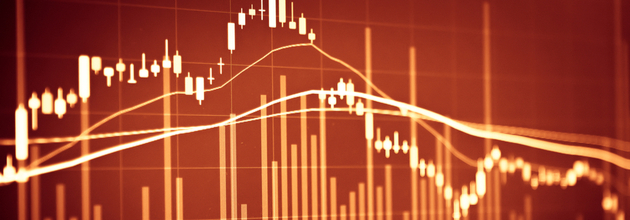 | Read in Browser |
 |
 |
| | Top News  Shutterstock U.S. stock index futures are trading down 0.6% following another rough session on Thursday as market closed out September and the third quarter. The S&P 500 finished the month off 4.8%, while the Dow and the Nasdaq slipped 4.3% and 5.4%, respectively. The losses - triggered by fears of inflation, slowing growth and rising interest rates - even led the S&P 500 to notch its worst monthly performance since the pandemic took hold in March 2020.
Currents from the sea of red are also spreading outside of the U.S. Over in Asia, the Nikkei 225 closed down 2.3%, while in Europe, the pan-European STOXX 600 fell 1.5% and major bourses slid into negative territory.
Analyst commentary: "For most of the last two or three decades, central banks have had a relatively easy task because every time we come up to a crisis, they have been free to ease policy considerably because of downward inflationary pressure," said Deutsche Bank strategist Jim Reid. "The problem now is that a lot of the exogenous forces at the moment are inflationary, whether it's supply chains or stimulus. This raises the risk of a policy error, but the problem is we don't know which way that policy error is. Is it to do too much (i.e. to keep stimulus going for too long), or is it to tighten policy with all the inflation around and risk choking off the recovery?"
On the economic calendar: Traders will be closely watching key inflation data set to be published at 8:30 a.m. ET. The core personal consumption expenditures price index, which surged an unexpected 1.1% in July, is expected to slow to a gain of 0.2% in August, but any more unforeseen surges could cause some panic. The inflation figure, which measures price change from the perspective of the consumer, is of utmost importance as the Federal Reserve uses it to set policy. | | Tech During a three-hour Senate hearing on Thursday, Facebook ( FB) came under fire from lawmakers who were upset about the revelations brought to light by The Wall Street Journal's "Facebook Files." Internal documents showed that Instagram makes body image issues worse for a substantial minority of teen girls and was blamed for increases in anxiety and depression. With the company on the defensive (and minimizing its own research), it looks to be signaling new enthusiasm among Senators for regulatory proposals that had stagnated a bit. Criticism from both sides of the aisle: "We now have deep insight into Facebook's relentless campaign to recruit and exploit young users. And we now know it is indefensibly delinquent in acting to protect them," said Sen. Richard Blumenthal (D-CT). "Facebook is incapable of holding itself accountable." Senator Marsha Blackburn (R-TN) was also quick to admonish the tech giant. "We do not trust you with influencing our children." Some, like Sen. Ed Markey (D-MA), even compared the social network to Big Tobacco, which "pushes a product that they know is harmful to the health of young people." He also announced plans to reintroduce legislation that would regulate a number of features, including follower counts, autoplay videos, and marketer and influencer promotions on apps aimed at young children. Go deeper: Facebook on Monday said it would pause work on a controversial effort to build an Instagram for those under 13 (currently prohibited from joining the service). During the hearing, however, Antigone Davis, Facebook director of global safety, was noncommittal about whether the company would shelve Instagram Kids for good. "Sen. Markey, those are the kinds of features that we will be talking about with our experts trying to understand in fact what is most age appropriate and what isn't age appropriate, and we will discuss those features with them of course." ( 32 comments) | | Sponsored By StartEngine  With a goal to help raise $10 billion by 2029, StartEngine has big plans... and they're already gaining momentum: - 146% revenue growth YoY in the first half of 2021.
- 500,000 prospective investors on the platform
- Led by Howard Marks, co-founder of Activision (NASDAQ:ATVI).
- Launched a first-of-its-kind trading platform
- $400M raised for more than 500 companies.
- Moving into wine collections, real estate, and more
Now you can join 22,000 other investors and invest in StartEngine itself. Check it out here for more information.
Disclaimer:Reg A+ offering made available through StartEngine Crowdfunding, Inc. Investment is speculative, illiquid, and involves a high degree of risk, including the possible loss of your entire investment. View StartEngine Crowdfunding, Inc's offering circular and selected risks. Past performance may not be indicative of future results.
| | M&A It was set to be the second biggest tech deal of the year, but Zoom Video Communications ( ZM) and Five9 ( FIVN) are calling off their $14.7B merger. Zoom had hoped the all-stock transaction would build on the explosive growth it experienced during the pandemic as it became a household name in a world without social contact. Five9 is a provider of cloud-based call center technology, which allows representatives to do their jobs from home. What happened? Five9 stockholders still had to approve the deal, but it did not receive the requisite number of votes. Proxy advisory firm ISS previously recommended FIVN holders vote against the tie-up on the grounds that a decline in ZM's share price has dragged down the value of the deal. Last week, Zoom also disclosed that a DOJ-led panel has been investigating the agreement over national security risks given Zoom's ties to China. Buying Five9 "presented an attractive means to bring to our customers an integrated contact center offering," Zoom CEO Eric Yuan wrote in a blog post. "That said, it was in no way foundational to the success of our platform, nor was it the only way for us to offer our customers a compelling contact center solution." Stock movement: Shares of Zoom and Five9 barely budged in premarket trade, suggesting investors had been anticipating a breakup. ( 5 comments) | | Explainer Keeping track of the latest happenings on Capitol Hill can get confusing, especially when deadlines are as close together as they are in the fall of 2021. While it's still too early to tell how things will play out, investors have been monitoring the events as lawmakers play politics with the nation's pocketbook. Here are the three big items that are on the radar and how they could impact your portfolio: Government funding - Congress last night passed stopgap spending legislation to avert a U.S. government shutdown, which was later signed by President Biden. The bill will keep the lights on at federal agencies through Dec. 3, giving Congress nine more weeks to pass a full budget plan. Buzz surrounding government shutdowns can trigger some market volatility, but this is the least likely event to affect investor holdings. Infrastructure - House Speaker Nancy Pelosi promised to move ahead with a vote on a $1.2T bipartisan infrastructure bill before Democrat progressives said they have the numbers to stall it. They want the Senate to agree to a separate $3.5T social spending and climate policy package (or what the White House terms "human infrastructure") before pressing ahead on this front. Negotiations are still ongoing, but the developments have the potential to dent some sentiment in the market, especially infrastructure-related names, since the bill was a key part of Biden's economic agenda. Debt ceiling - Treasury Secretary Janet Yellen has said the U.S. will run out of funds to pay its bills by mid-October and even called on Congress yesterday to eliminate the mechanism entirely. A default would "likely precipitate a historic financial crisis that would compound the damage of the continuing public health emergency," according to Yellen. It could also "trigger a spike in interest rates, a steep drop in stock prices and other financial turmoil. Our current economic recovery would reverse into recession, with billions of dollars of growth and millions of jobs lost." ( 11 comments) | | Today's Markets In Asia, Japan -2.3%. Hong Kong -0.4%. China +0.9%. India -0.6%.
In Europe, at midday, London -1.1%. Paris -0.7%. Frankfurt -0.8%.
Futures at 6:20, Dow -0.6%. S&P -0.6%. Nasdaq -0.6%. Crude -0.7% at $74.53. Gold -0.1% at $1755.40. Bitcoin +9.3% at $46918.
Ten-year Treasury Yield -3 bps to 1.49%
Today's Economic Calendar | | | | | | | | Seeking Alpha's Wall Street Breakfast Podcast Seeking Alpha's Wall Street Breakfast podcast brings you all the news you need to know for your market day. Released by 8:00 AM ET each morning, it is a quick listen that you can put on as you get ready to start your working day. | | | | |











EmoticonEmoticon